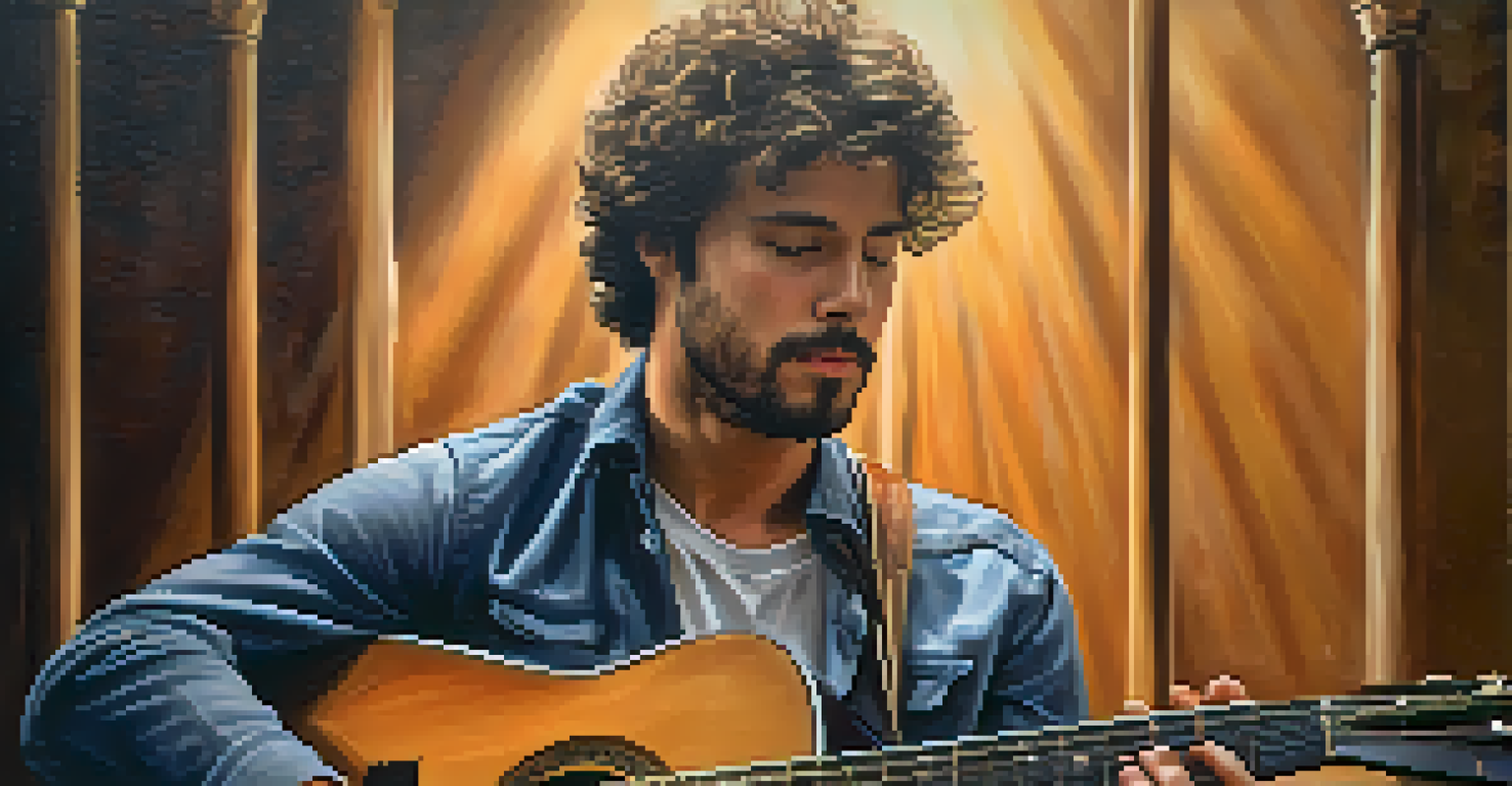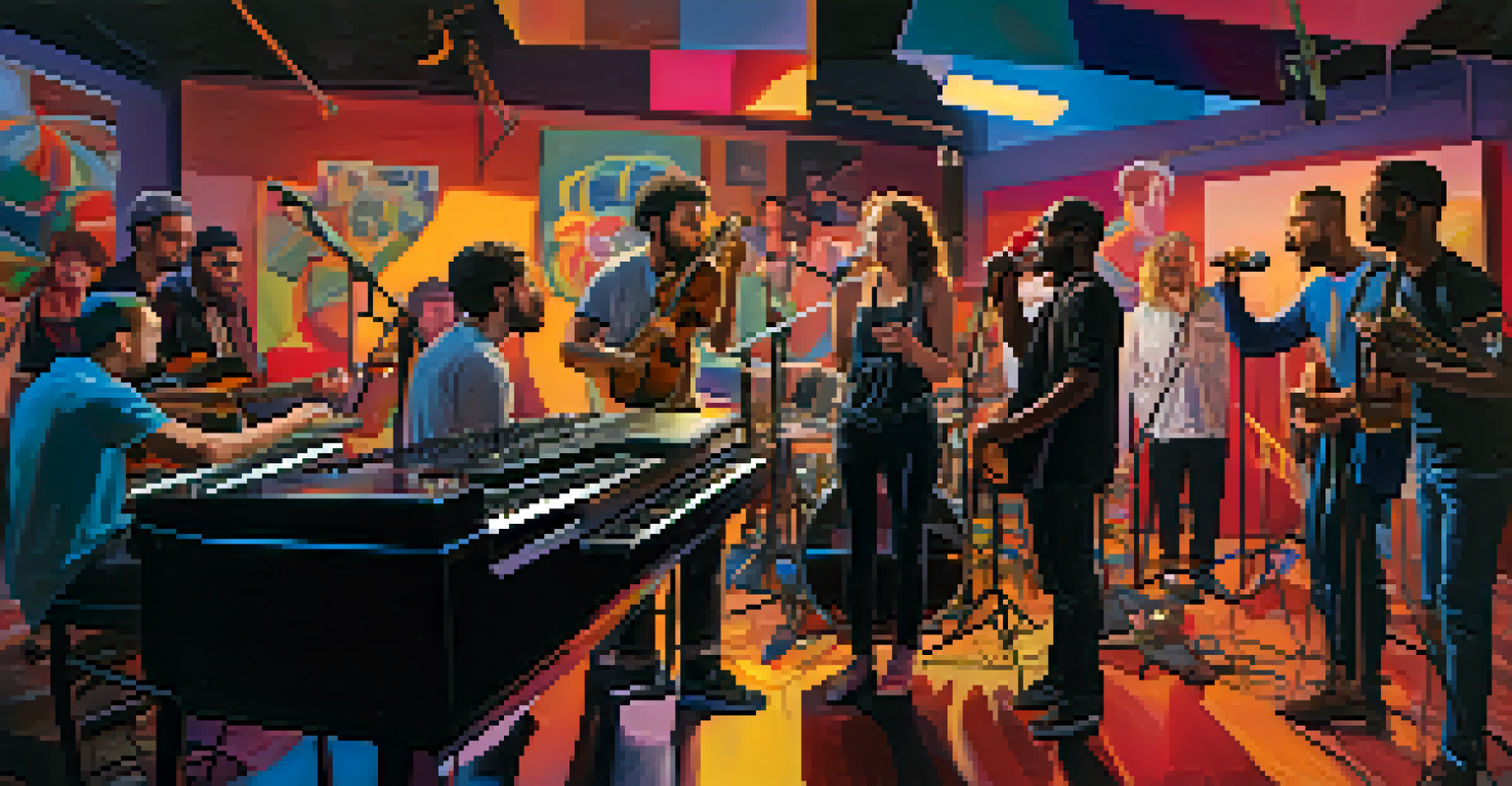Music as a Tool for Global Awareness and Advocacy

The Universal Language of Music and Its Impact
Music transcends borders, languages, and cultures, making it a unique tool for global communication. When we listen to a song, we often feel emotions that resonate deeply, regardless of the language in which it's sung. This universal appeal allows musicians to share important messages about social issues and injustices that might otherwise go unheard. For instance, songs like 'Imagine' by John Lennon encourage peace and unity, sparking conversations around global harmony.
Music can change the world because it can change people.
Moreover, music can bring people together during times of crisis, creating a sense of solidarity and shared purpose. Consider how artists like Beyoncé and Jay-Z collaborated on 'Freedom' to highlight the Black Lives Matter movement. Their music not only entertains but also educates listeners about systemic racism and encourages activism. This ability to blend art with advocacy is what makes music such a powerful medium.
In essence, music serves as a bridge, connecting individuals from diverse backgrounds and fostering understanding. By harnessing this power, artists and advocates can raise awareness about critical global issues, inspiring action and change. The emotional pull of music can motivate listeners to engage with causes they may not have considered before.
Historical Examples of Music in Advocacy Movements
Throughout history, music has played a pivotal role in advocacy movements, often serving as anthems for change. The civil rights movement in the United States, for example, saw songs like 'We Shall Overcome' become rallying cries for equality and justice. These songs not only provided comfort to those involved but also spread messages of hope and resilience to a wider audience, cementing music's place in social movements.

Similarly, during the anti-apartheid struggle in South Africa, artists like Miriam Makeba and Hugh Masekela used their music to raise awareness about the injustices faced by their people. Their songs highlighted the harsh realities of apartheid, igniting passion and action both locally and globally. This demonstrates how music can serve as a powerful tool for storytelling, giving voice to those who have been marginalized.
Music as a Global Communication Tool
Music transcends cultural barriers, allowing artists to convey important social messages and connect people worldwide.
These historical examples underscore the impact of music in shaping public opinion and influencing policy. When people connect emotionally with a song, they are more likely to engage with the issues it addresses. This powerful blend of art and activism reveals music's potential to inspire social change across generations.
Modern Artists Championing Global Issues
In today's world, many artists continue to use their platforms to advocate for pressing global issues. For example, Billie Eilish has been vocal about climate change, using her music and social media presence to raise awareness about environmental concerns. Her song 'All the Good Girls Go to Hell' serves as a creative commentary on the climate crisis, urging listeners to take action and rethink their choices.
The power of music makes all the difference in the world.
Similarly, artists like Childish Gambino and his song 'This Is America' tackle issues of gun violence and systemic racism, sparking widespread conversations about these topics. By integrating powerful visuals and lyrics, these musicians effectively engage their audience and encourage them to reflect on critical social issues. This modern approach to advocacy showcases how artists are evolving to meet the challenges of our time.
These contemporary examples illustrate that music remains a vital tool for advocacy, adapting to the ever-changing landscape of global issues. As artists harness their creativity to inspire change, they remind us of the responsibility we all share in making the world a better place.
The Role of Music Festivals in Advocacy
Music festivals have become significant platforms for raising awareness about global issues. Events like Live Aid and Farm Aid not only entertain but also educate attendees about critical social and environmental causes. By gathering artists and audiences together, these festivals create a unique opportunity to amplify advocacy messages and mobilize support for various initiatives.
For instance, the Global Citizen Festival combines music with advocacy, calling on world leaders to take action on poverty and climate change. Attendees are encouraged to engage, sign petitions, and advocate for change, all while enjoying performances from their favorite artists. This blend of entertainment and activism creates a dynamic environment where awareness can flourish.
Historical Impact of Music in Movements
Throughout history, music has served as anthems for social change, uniting individuals and spreading messages of hope and resilience.
As music festivals continue to grow in popularity, their potential to drive social change becomes increasingly apparent. They not only raise funds for important causes but also cultivate a sense of community among attendees who share similar values. This communal experience reinforces the idea that music can be a catalyst for positive change.
The Impact of Social Media on Music Advocacy
In the digital age, social media plays a crucial role in amplifying music's power as a tool for advocacy. Platforms like Instagram, Twitter, and TikTok allow artists to reach a global audience instantly, sharing their messages far and wide. This accessibility enables musicians to engage with fans directly, fostering a sense of connection that can drive social change.
For example, many artists use social media to promote charitable initiatives, share personal stories, and encourage followers to take action. The viral nature of social media can turn a single song or post into a movement, as seen with campaigns like #BlackLivesMatter and #MeToo. The ability to mobilize supporters quickly and effectively demonstrates the potential of music combined with digital platforms.
Ultimately, social media enhances the impact of music advocacy by creating a space for dialogue and engagement. As artists navigate this ever-evolving landscape, they can harness the power of connection to inspire change and raise awareness about vital issues. This synergy between music and social media truly highlights the role of technology in modern advocacy.
Collaborations for Change: Artists Uniting
Collaborative projects among artists have emerged as a powerful means of advocating for social change. When musicians from different backgrounds come together, they can create a more significant impact and reach a broader audience. For instance, the single 'One World' featured numerous artists coming together during the COVID-19 pandemic to raise funds and awareness for global health efforts.
These collaborations often highlight the importance of unity in addressing complex global issues. By working together, artists can blend their diverse perspectives and talents, crafting songs that resonate on multiple levels. This collective effort not only amplifies their message but also showcases the strength found in diversity.
Digital Age Enhances Music Advocacy
Social media amplifies the reach of music advocacy, enabling artists to engage directly with fans and mobilize support for vital causes.
Ultimately, collaborations for change serve as a reminder of the power of community in advocacy. When artists join forces, they can inspire their fans to rally around a cause, fostering a sense of shared responsibility. This approach emphasizes that together, we can make a more significant impact and drive the change we wish to see in the world.
The Future of Music in Global Advocacy
As we look to the future, the role of music in global advocacy is likely to evolve further. With the increasing awareness of social issues and the power of digital platforms, artists have more opportunities than ever to make an impact. The continued fusion of music, technology, and activism will likely lead to innovative approaches that engage and inspire audiences around the globe.
Moreover, the rise of diverse voices in the music industry can enrich the conversation around social issues, bringing new perspectives to light. This representation can foster empathy and understanding, prompting listeners to engage with topics they may have previously overlooked. As music becomes an even more inclusive space, its potential for advocacy will only grow.

In conclusion, the future of music as a tool for global awareness and advocacy is bright. As artists harness their creativity and passion, they will continue to inspire change and drive conversations about critical issues. Together, we can look forward to a world where music not only entertains but also empowers.